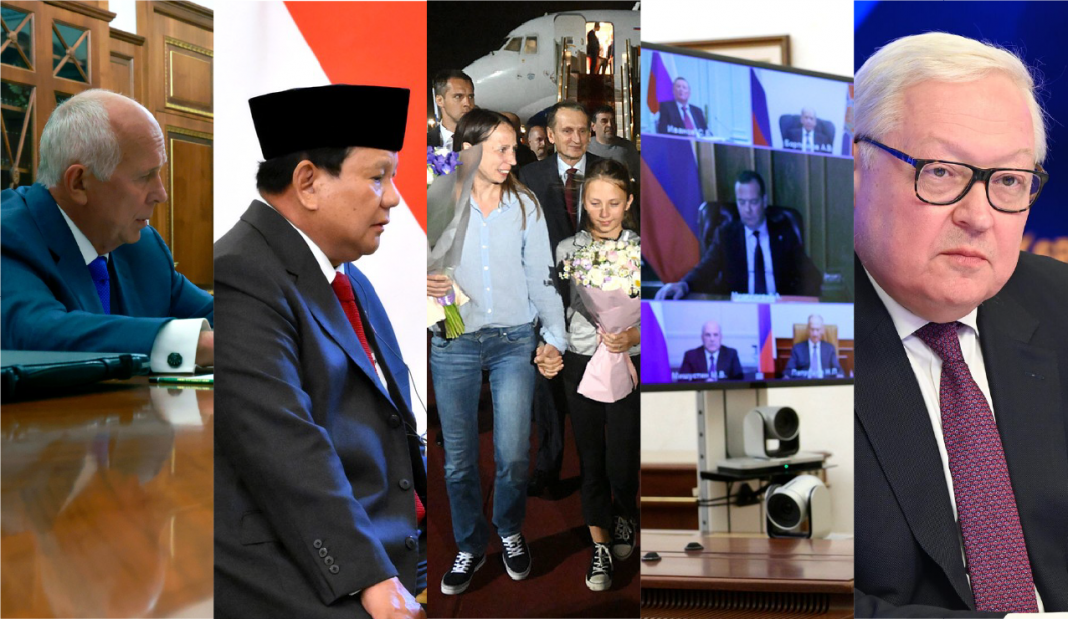This report presents key events that had an important impact on political, economic and social processes within Russia.
According to the results of the past week the following trends can be defined in the following thesis:
- According to Ascolta, during a meeting with members of the Russian Security Council, the issue of possible strengthening of contacts with the West – up to the point of elaborating Russia’s position in possible negotiations with the United States and NATO – was discussed. This is indirectly confirmed by several statements by individual politicians and officials. If this information is confirmed, we should expect a return to the attempt to negotiate new conditions of geopolitical stability, which was carried out in early 2022 but ended in the collapse of diplomacy.
- The statement by Sergei Ryabkov (one of the representatives of the “hawks” in Russian diplomacy) is not an announcement of upcoming steps, but a demonstration of possibilities, a push for the West to positively resolve the issue regarding the preparation of a new agreement on strategic arms control and the INF Treaty. Ryabkov talks about the mirroring of the steps, realising that this will cause sharp reactions and concerns in the West. Thus, the messages regarding possible actions on Russia’s part are more about preparing public opinion for the need for a negotiation process between Russia on the one hand and the United States and NATO on the other.
- The topic of the functioning of the defence industry is extremely important to Putin – especially in the current “Cold War 2.0”, when the opposing sides are demonstrating their capabilities in the arms race and in the development of military technologies. The meeting with Chemezov should also emphasise that predictions of Chemezov’s disgrace and possible resignation are untenable: virtually all of Chemezov’s clientele are in their posts (Vaino, Manturov, Alikhanov and others).
This digest looks at the following issues that were most relevant to Russia between 29 July and 4 August:
- Vladimir Putin meeting with Sergei Chemezov, head of Rostec State Corporation;
- Russian-Indonesian negotiations;
- Prisoner exchange between Russia, the United States and Germany;
- Meeting with the permanent members of the Security Council;
- Sergey Ryabkov’s statement on the possibility of Russia deploying nuclear missiles in response to US actions.
This Content Is Only For Subscribers
- Vladimir Putin meets with Sergey Chemezov, head of Rostec State Corporation
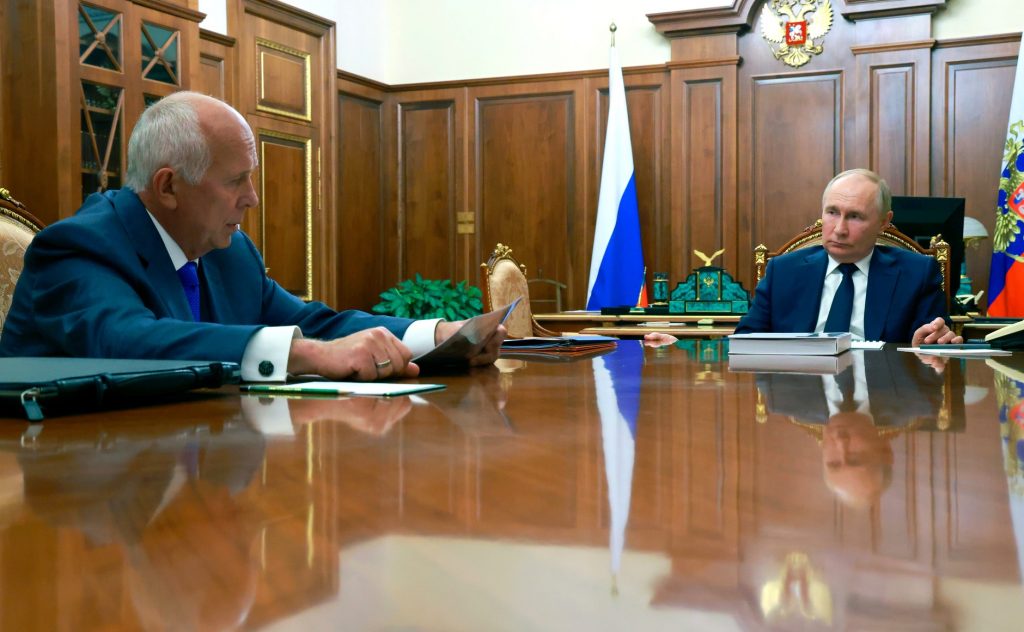
On Tuesday, 30 July, Vladimir Putin met with Sergey Chemezov, head of Rostec State Corporation, in the Kremlin. During the meeting Chemezov presented Putin with a report on the results of the state corporation’s work for 2023, as well as reported on its current activities. It is also noted that Putin and Chemezov discussed key decisions and tasks to strengthen Russia’s security and defence capabilities, as well as to further build up its industrial potential.
Key Abstracts:
- Chemezov: “A few figures that I would like to show and tell you. First of all, the consolidated revenue of the corporation, which has increased by almost 34 per cent to 2,840 billion. We hope that this year, in 2024, we will cross the threshold of three trillion. Our net profit has also increased, totalling 60,100 million. Unfortunately, this is still not a very high profit for the kind of revenue that we are showing today, but this is first and foremost an indication of the fact that we have a large volume of contracts under the state defence order”.
- Chemezov: “Today, if in absolute figures, we have increased the volume of civilian production by 5.5 per cent and today it amounts to almost a trillion, 993 billion to be exact.”
- Chemezov: “The volume of investments in 2023 has increased and totalled 527 billion. This is a record amount compared to all previous years. For example, in 2022 it was only 292 billion. This shows that today we have to expand production, modernise the production of military equipment, weapons, ammunition and so on. That is why the bulk of investments go to modernisation and expansion of production facilities”.
- Chemezov: “In 2023, we delivered new serial Su-34, Su-57, Su-35, Il-76, Yak-130 aircraft, Mi-28 and Ka-52 helicopters, and T-90M Breakthrough tanks to our main customer, i.e. the Ministry of Defence. In general, all this is both new equipment and deeply modernised. And compared to 2022, the volume of production and overhaul of light armoured vehicles has increased three times, and tanks – 3.5 times. The output of rounds for tanks and infantry fighting vehicles – almost nine times. But also in comparison with 2022, in 2023 the output of self-propelled artillery increased tenfold and the production of ammunition increased tenfold.”
- Chemezov: “We are continuing work on the adaptation of standard aircraft munitions, such as the well-known FAB-500. We are already producing them and have adapted them to the planning and correction module. In 2023, we restored the production of FAB-1500 and FAB-3000, because at one time this production was suspended, now we have restored it. And already this year, in 2024, we have adapted them to the planning and correction module, and the first of these adapted bombs are already being used on the front line today.”
- Chemezov: “At the start, when we assessed the scale of the sanctions and the scope of the technological partnership that we had been building with our Western partners for many years, buying a large number of components, we hoped that our co-operation would continue forever, but unfortunately, this did not happen. When we faced the task to carry out a large import substitution work, frankly speaking, we did not really believe that we would be able to do it. As the saying goes, the eyes fear, but the hands do. We have already imported tens of thousands of components and products throughout Rostec.
- Chemezov: “A vivid example is KAMAZ. We have replaced thousands of components at KAMAZ and are now successfully covering the needs of trucks, specialised vehicles, passenger vehicles and so on.
- Chemezov: “Our Remdiesel enterprise has already completed the development of a special vehicle for the safe transport of military personnel called Akhmat within 25 days in 2023. At one time you asked us to create such a vehicle at the request of Ramzan Kadyrov. We made such a vehicle. We presented the first ten vehicles to units of Chechen fighters. And today we have already produced more than a thousand of them, and they have proved themselves very well.
- Chemezov: “On machine tool construction: our holding company Stan has developed and started to produce a robotic machining grinding centre – it is a multifunctional grinding machine with numerical control. It is designed for diamond grinding of carbide cutting inserts – for tool making”.
Totals/Predictions:
The topic of the functioning of the defence industry is extremely important to Putin – especially in the current “Cold War 2.0”, when the opposing sides are demonstrating their capabilities in the arms race and in the development of military technologies. The meeting with Chemezov should also emphasise that predictions of Chemezov’s disgrace and possible resignation are untenable: virtually all of Chemezov’s clientele are in their posts (Vaino, Manturov, Alikhanov and others).
It is also important to note that amid the intensification of the global economic crisis, Russia is trying its best to demonstrate the sustainability of its economy and the possibility of a complete restructuring of the production chain, coping with the diversification of dependence on imported components. The extent to which such an approach will prove to be reliable is likely to be seen this autumn.
- Russian-Indonesian negotiations
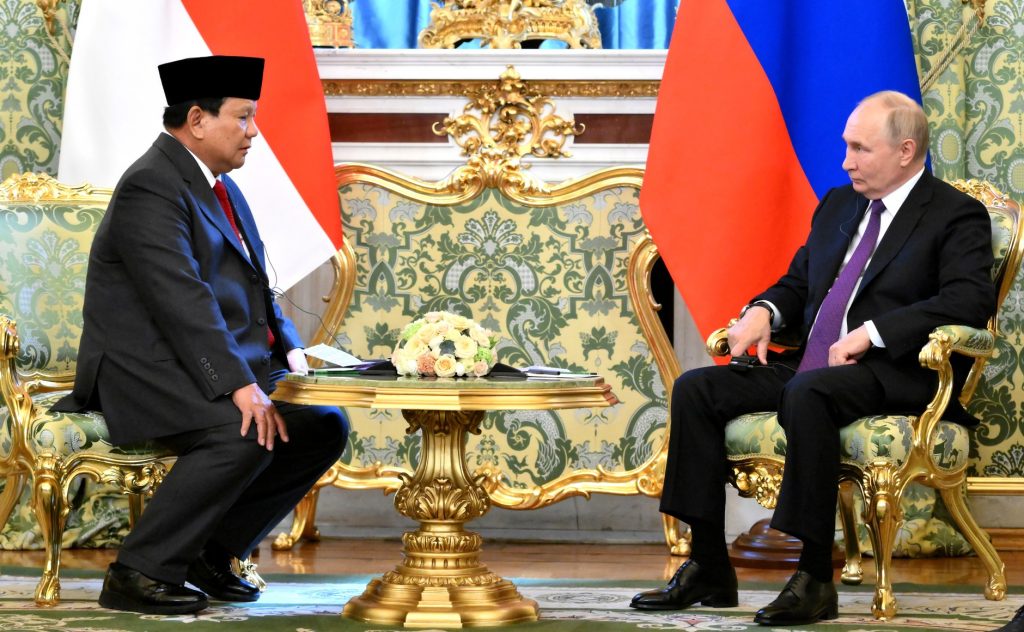
On Wednesday, 31 July, the recently elected President of the Republic of Indonesia, the current Minister of Defence Prabowo Subianto, arrived in Moscow on a working visit. The purpose of the visit was to hold talks with Vladimir Putin, which were held in a narrow and extended format. It is noted that the talks on the Russian side were also attended by Presidential Aide Yuri Ushakov, First Deputy Prime Minister and Chairman of the Russian part of the Russian-Indonesian Joint Commission on Trade, Economic and Technical Cooperation Denis Manturov and Foreign Minister Sergei Lavrov.
Key messages from the narrowly negotiated talks:
- Putin: “We know you well, we know you as a friend of our country. You are a well-known not only military but also political figure in Indonesia. You have continued to be the Minister of Defence for many years. I know that you have very good relations with your Russian colleagues.”
- Putin: “I must note that trade and economic ties have been developing very successfully recently: despite the pandemic and all the events that are happening around Russia and the restrictions associated with it, we still have a growing trade turnover – it has doubled in recent years. This is a very good trend, and it continues to please us. I hope that the situation will continue.
- Putin: “We also express the hope that the agreement on a free trade zone between Eurasia and Indonesia, which has already been prepared for signing, will also play a very positive role in the development of our trade and economic ties. The Eurasian market is quite large and capacious. The market of Indonesia, a country with a population of almost 300 million people, is also of great interest to Russia”.
- Subianto: “This is the fourth time I have come to Moscow in the last four years, the fourth time you have received me, Your Excellency. And I have the warmest memories of it. And I also want to convey to you the best wishes of [Indonesian] President Joko Widodo, I informed him that our meeting will take place. And I also want to congratulate you on your re-election as President of the Russian Federation”.
- Subianto: “As you know, we regard Russia as a great friend of our country. I would like to continue to further develop this kind of relationship with your country. We remember from history that Russia has always helped us in many ways. When we have experienced difficulties, Russia has come to our aid.”
- Subianto: “Of course, we have already talked about the fact that in addition to food security and energy security, I would like to emphasise education. I plan to initiate a substantial scholarship programme so that we can send our students to study outside Indonesia. This is especially true for the training of medical students because we are short of 160,000 doctors. If possible, we would like to send some of our young students to the Russian Federation to study in universities, technical colleges. I plan to allocate a special budget for these scholarship needs”.
- Subianto: “As far as other sectors are concerned, we look forward to intensive co-operation in a number of tactical areas. I would like to invite a Russian delegation to our defence industry exhibition in November this year. And I would also like to invite Russian participants to our naval parade to be held in early 2025. I have promised your Defence Minister that we will send our naval contingent to participate in your next Navy Day parade. We have received such an invitation and we will be happy to participate.”
Totals/Predictions:
Indonesia has recently been playing an important role in the Global South. Interestingly, the Indonesian Defence Minister’s visit to Russia followed immediately after Xi Jinping’s special envoy Li Hui’s visit to Indonesia in Jakarta – during which the prospects for a Chinese plan for a peaceful settlement of the Russia-Ukraine conflict were discussed. Obviously, Indonesia is now trying to finalise its position on this issue. But it seems that Jakarta is leaning towards de facto support for Russia.
- Prisoner exchange between Russia, the United States and Germany
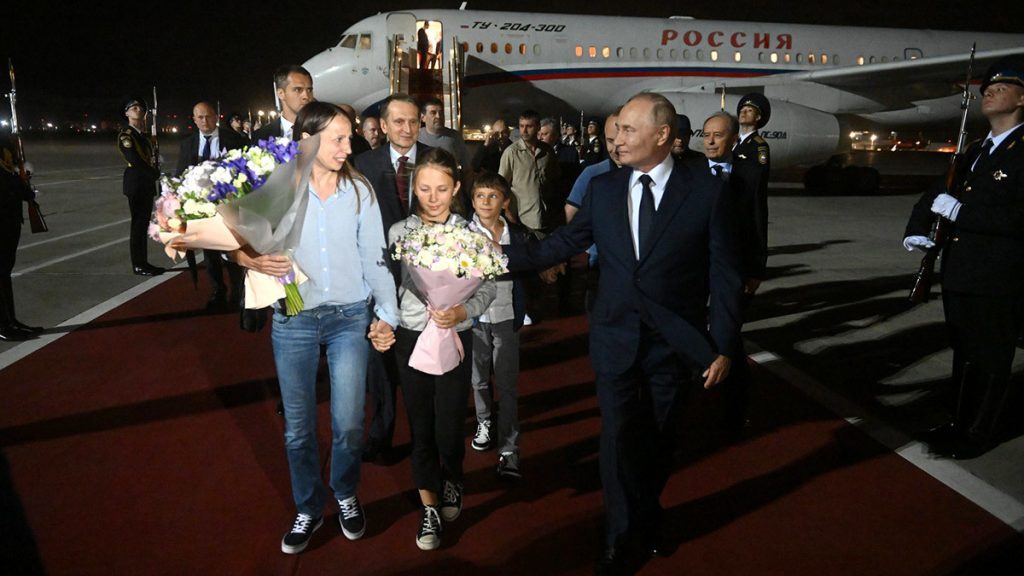
At the beginning of last week, information began to appear in a number of media outlets about the transfer from Russian prisons of several prisoners who are serving sentences for political offences or who are considered to be foreign intelligence agents. At the same time, a number of observers and insiders spoke about a planned exchange of prisoners between Russia and the United States.
Already on Thursday, 1 August, it became officially known about the unprecedented exchange of prisoners between Russia, Belarus, Germany, the USA, Slovenia and a number of other countries. There were 24 names on the list – eight people returned to Russia, and 16 Moscow handed over to the West. Turkey acted as an intermediary in the prisoner exchange procedure and the prisoners were exchanged in Ankara.
Among those released are Wall Street Journal reporter Evan Gershkovich and FSB special forces officer Vadim Krasikov. It is noteworthy that the former had been trying to be returned to the United States for more than a year, while Russian President Vladimir Putin personally wanted to secure the release of the latter.
It is noteworthy that the list of prisoners handed over by Russia mainly included political dissidents, including Vladimir Kara-Murza, Ilya Yashin, Andrei Pivovarov, Ksenia Fadeeva and others. Already after the exchange, they managed to make a number of public statements. Among them, Ilya Yashin called to stop the war between Russia and Ukraine and sit down at the negotiating table.
Totals/Predictions:
A very important point. Firstly, the history of the Cold War in the 40s-80s of the twentieth century is, among other things, the history of the constant exchange of spies (between the USSR and the West). Now this tradition has been restored, which shows the growth of espionage and intelligence activity, as well as the improved work of counterintelligence structures.
Secondly, it is evidence that the channels of communication between Moscow and Washington are working, and working quite effectively. Third, the exchange showed the complete dependence of some European states (primarily Germany) on the US position, as well as the lack of room for political independence of Washington’s European “partners”.
Fourth, within Russia, Putin received a serious image boost by showing that “Russia does not abandon its own”. In general, such exchanges are usually harbingers of minor warming and signals of the possibility of negotiations between states.
- Meeting with the permanent members of the Security Council
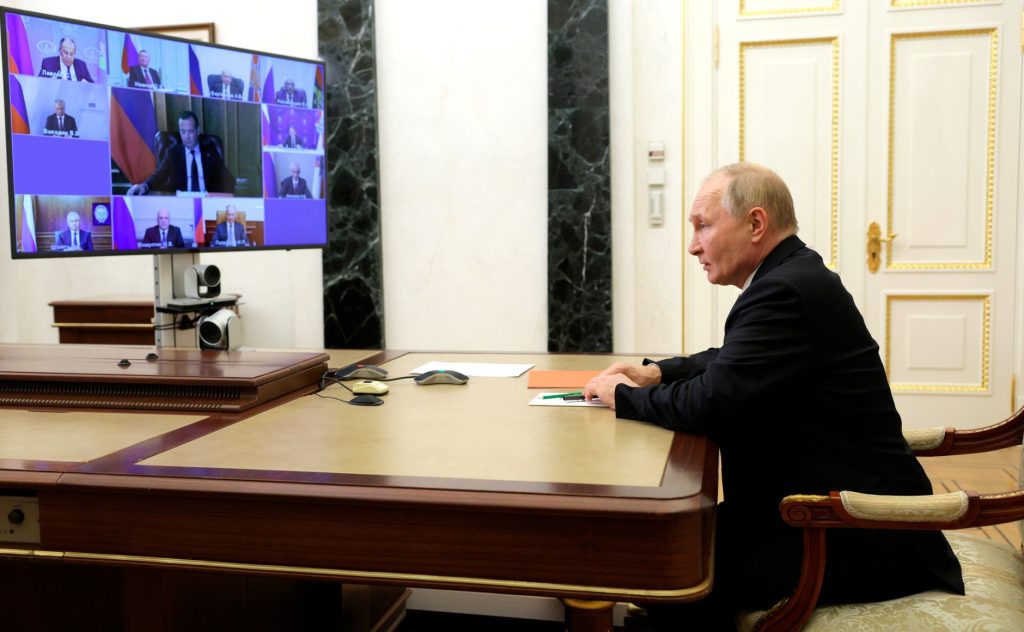
On Friday, 2 August, Vladimir Putin held a traditional online meeting with permanent members of the Security Council. It is noteworthy that the topic of this meeting was not publicly announced. The official press release notes only that it dealt with topical issues on the international agenda important to Russia and its interests. It is also known that the speakers were Foreign Minister Sergey Lavrov and Director of the Foreign Intelligence Service Sergey Naryshkin.
The meeting was also attended by Prime Minister Mikhail Mishustin, State Duma Chairman Vyacheslav Volodin, Deputy Chairman of the Security Council Dmitry Medvedev, Secretary of the Security Council Sergei Shoigu, Defence Minister Andrei Belousov, Interior Minister Vladimir Kolokoltsev, Director of the Federal Security Service Alexander Bortnikov, Special Presidential Envoy for Environmental Protection, Ecology and Transport Sergei Ivanov, and Assistant to the President Nikolai Patrushev.
Totals/Predictions:
According to Ascolta, during a meeting with members of the Russian Security Council, the issue of possible strengthening of contacts with the West – up to the point of elaborating Russia’s position in possible negotiations with the United States and NATO – was discussed. This is indirectly confirmed by several statements by individual politicians and officials. If this information is confirmed, we should expect a return to the attempt to negotiate new conditions of geopolitical stability, which was carried out in early 2022 but ended in the collapse of diplomacy.
- Sergey Ryabkov’s statement on the possibility of Russia deploying nuclear missiles in response to US actions
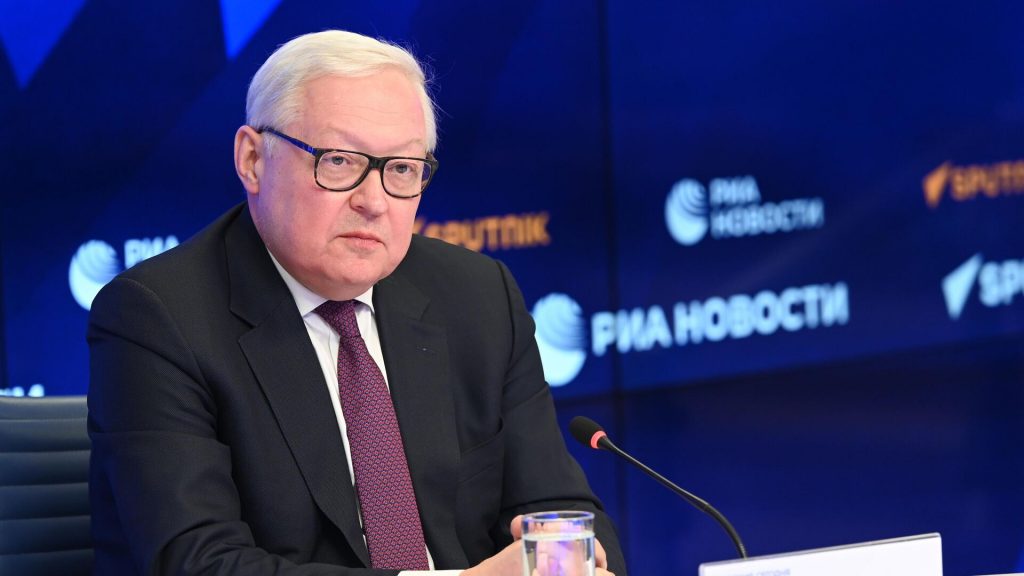
Despite a number of predictions of warming relations between Moscow and Washington, especially against the backdrop of the unprecedented prisoner exchange, diplomatic officials continue to voice threats leading to an apparent escalation of relations. For example, on Sunday, 4 August, Russian Deputy Foreign Minister Sergei Ryabkov said on the Rossiya-1 TV channel that Russia may need to deploy nuclear-capable missiles in response to the actions of Western countries. This was his reaction to the US plans, which had announced the previous day that from 2026 they would start deploying long-range SM-6 and Tomahawk missiles in Germany, as well as hypersonic weapons being developed in the country.
“But they have to make that decision based on a combination of factors. I admit that there may come a moment when it will be necessary,” he said in response to a question about the possibility of deploying Russian nuclear missiles after similar Western actions.
It is important to note that earlier, in response to such US plans, the Russian president noted that in such a case he would cease to fulfil the unilateral moratorium on the deployment of medium-range and shorter-range strike capabilities.
Ryabkov also reminded that the “doomsday clock” shows a high risk of total war, in connection with which everyone should be more cautious: “‘I would say that this clock now shows something like this without two minutes, but it does not mean that the clock is irreversible and the battle of the “doomsday clock” will begin. We need to take a responsible approach to what is happening. The military needs to ‘keep its powder dry’, because there could be all kinds of scenarios.
Totals/Predictions:
The statement by Sergei Ryabkov (one of the representatives of the “hawks” in Russian diplomacy) is not an announcement of upcoming steps, but a demonstration of possibilities, a push for the West to positively resolve the issue regarding the preparation of a new agreement on strategic arms control and the INF Treaty. Ryabkov talks about the mirroring of the steps, realising that this will cause sharp reactions and concerns in the West. Thus, the messages regarding possible actions on Russia’s part are more about preparing public opinion for the need for a negotiation process between Russia on the one hand and the United States and NATO on the other.

